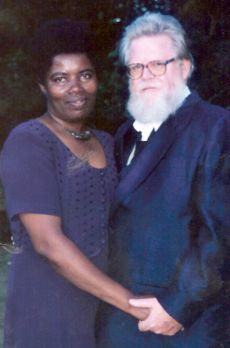Diferencia entre revisiones de «Usuario:Philbartle»
De WikiEducator
(→Phil's Rants) |
(→Phil's Rants) |
||
| Línea 52: | Línea 52: | ||
Mis pensamientos ocasionales sobre el WikiEducador y su comunidad | Mis pensamientos ocasionales sobre el WikiEducador y su comunidad | ||
| − | * '''Teachers and taught'''. Thinking about the discussion on WikiEd about education best being a two way process between teachers and taught, I am reminded of one of the pillars of community empowerment, which is an emphasis on participatory methods. Participation in teaching and training is one way, and perhaps there are others, to help blur the line between teachers and taught, which is good, and to encourage the process as two way. One hindrance may be class discipline. Some teachers have an excessive need for complete class control, although it is doubtful that discipline is so important for good teaching and learning. When a teacher spends too much time and effort on class discipline, little is left over for creative and effective education. An important feature is an emphais on doing. Many educators on WikiEd see doing as more effective methods for teaching (and retention of the material) than listening or watching. It is certainly promoted on Community empowerment. The element of "doing" can be included in several ways, simulation games, field exercises with direct or indirect supervision, practice teaching in the class by students, and others. In the functional literacy module, it is recomended that the whole classroom structure be abandoned, and that students come to the room as if it were a planning session and plan methods, eg. field trips, to collect material for the content of the literacy course, then come back to that room to jointly create and develop signs or pamphlets using the words that were observed as important during the field trips. Examples could be fish prices in fishing communities, agricultural advice in farming communities. When adults are the students, respect for them is very important, and this is a way to show respect, for their input is not merely a made up exercise, but contributes to the course content, an produces a useful product in the end. With some imagination and creativity, we can expand the principles into a whole range of topics to be taught and learned. | + | * '''Teachers and taught'''. Thinking about the discussion on WikiEd about education best being a two way process between teachers and taught, I am reminded of one of the pillars of community empowerment, which is an emphasis on participatory methods. Participation in teaching and training is one way, and perhaps there are others, to help blur the line between teachers and taught, which is good, and to encourage the process as two way. One hindrance may be class discipline. Some teachers have an excessive need for complete class control, although it is doubtful that discipline is so important for good teaching and learning. When a teacher spends too much time and effort on class discipline, little is left over for creative and effective education. An important feature is an emphais on doing. Many educators on WikiEd see doing as more effective methods for teaching (and retention of the material) than listening or watching. It is certainly promoted on Community empowerment. The element of "doing" can be included in several ways, simulation games, field exercises with direct or indirect supervision, practice teaching in the class by students, and others. In the functional literacy module, it is recomended that the whole classroom structure be abandoned, and that students come to the room as if it were a planning session and plan methods, eg. field trips, to collect material for the content of the literacy course, then come back to that room to jointly create and develop signs or pamphlets using the words that were observed as important during the field trips. Examples could be fish prices in fishing communities, agricultural advice in farming communities. When adults are the students, respect for them is very important, and this is a way to show respect, for their input is not merely a made up exercise, but contributes to the course content, an produces a useful product in the end. With some imagination and creativity, we can expand the principles into a whole range of topics to be taught and learned.--[[Usuario:Philbartle|Phil Bartle]] 23:44 6 jul 2009 (UTC) |
* Thoughts from Al: '''If it is not a business it probably should not be run like one''', Bravo, Phil. Here in the U.S. too many of our schools are run like a business. Unfortunately, that business is a factory, and it's product is preparing people for jobs in manufacturing. This made sense in the 1950s (maybe) but is poor preparation for the current times. This model has managed to take essential, rich and fascinating subjects like history, science, math, language (and most others) and make them BORING, obtuse, meaningless, and wholly disconnected from life as the students know it. It caters best to the elite, whose parents can supplement it, and whose school districts have the money and the foresight to raise the additional funds needed to offset the penurious and misdirected funds from the state. Higher Ed, for those who can afford it and can get in, seems to focus on preparing people for careers in Higher Ed--careers most college students don't necessarily want and likely won't get. --[http://www.wikieducator.org/User:Alboss alboss] 15:31, 13 June 2009 (UTC | * Thoughts from Al: '''If it is not a business it probably should not be run like one''', Bravo, Phil. Here in the U.S. too many of our schools are run like a business. Unfortunately, that business is a factory, and it's product is preparing people for jobs in manufacturing. This made sense in the 1950s (maybe) but is poor preparation for the current times. This model has managed to take essential, rich and fascinating subjects like history, science, math, language (and most others) and make them BORING, obtuse, meaningless, and wholly disconnected from life as the students know it. It caters best to the elite, whose parents can supplement it, and whose school districts have the money and the foresight to raise the additional funds needed to offset the penurious and misdirected funds from the state. Higher Ed, for those who can afford it and can get in, seems to focus on preparing people for careers in Higher Ed--careers most college students don't necessarily want and likely won't get. --[http://www.wikieducator.org/User:Alboss alboss] 15:31, 13 June 2009 (UTC | ||
Revisión de 12:44 7 jul 2009
Phil's RantsThe athlete will not get stronger Traducido por Cristina Varela Mis pensamientos ocasionales sobre el WikiEducador y su comunidad
UtilitidadesContactos frecuentesOur little band, y amig@s de Potenciacion Comunitaria
Comentarios de mis WikivecinosPlease put your comments on the Discussion Page. Click on the discussion tab at the top of this page.--Phil Bartle 03:07 3 may 2009 (UTC)
|
|||||||||||||||||||||||||||||||||||||||||||||||

